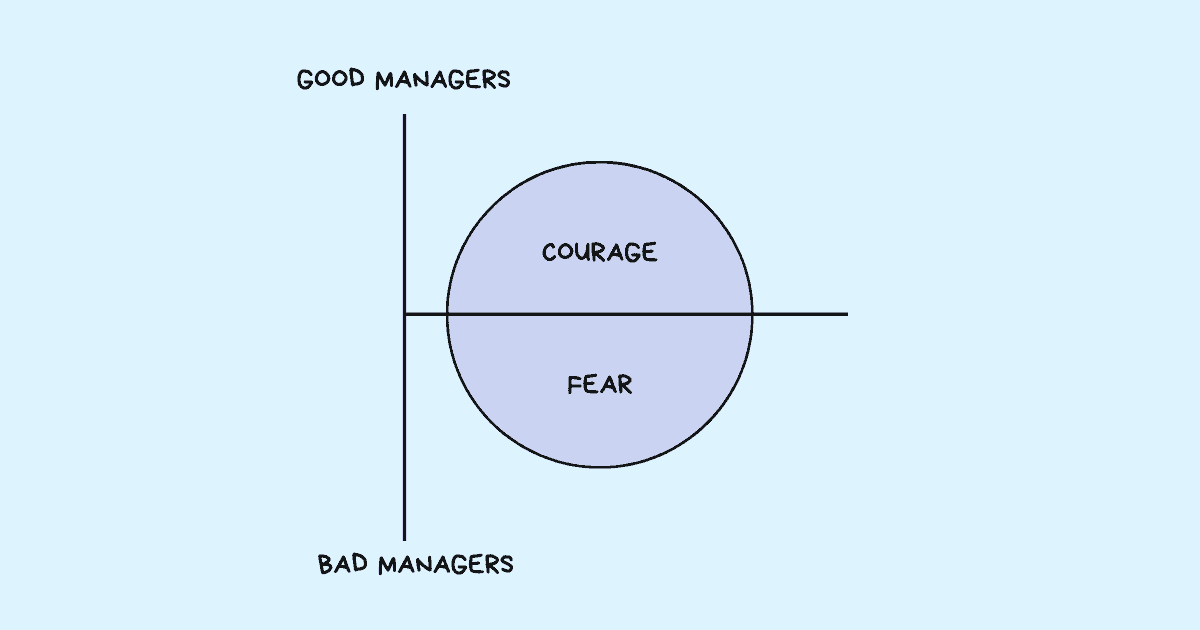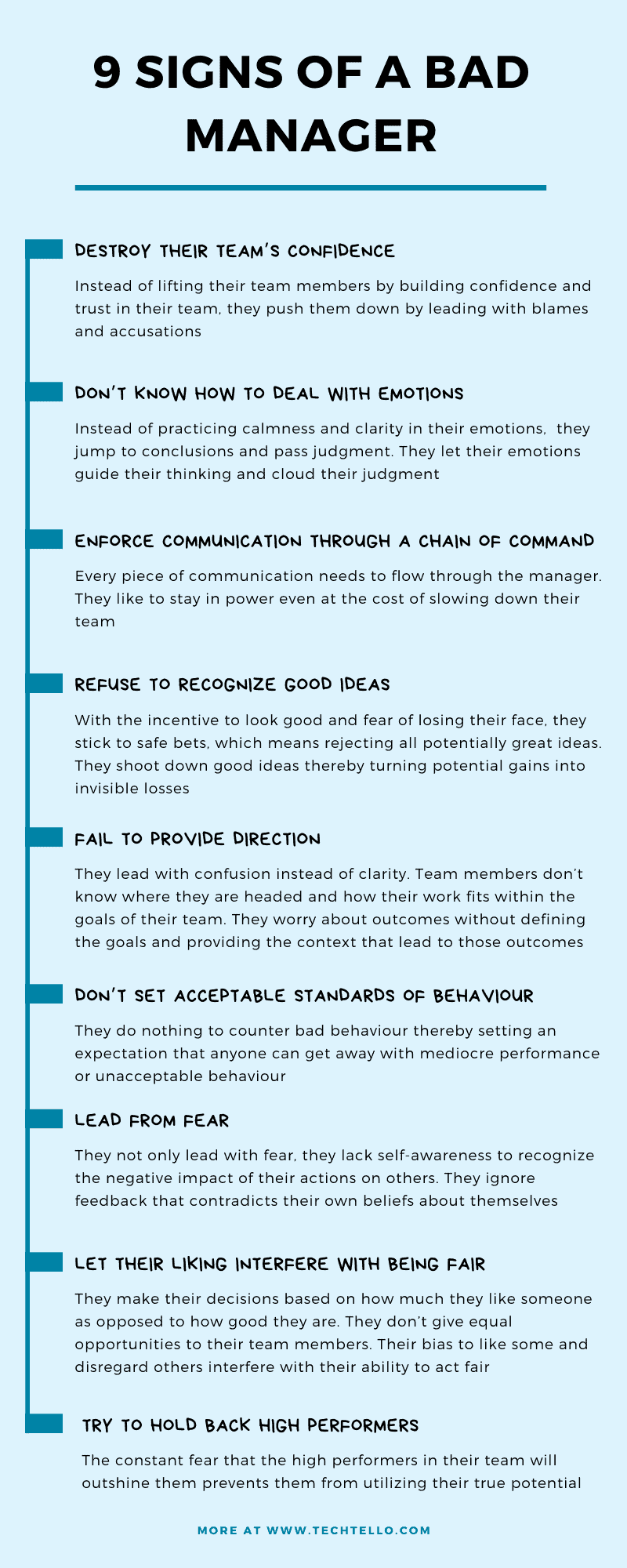Bad Managers: What Not to Do When Everyone Looks to You

If you have worked long enough, chances are you have encountered a bad manager yourself. What was it about them that irked you the most – were they unforgiving, critical, demanding, abusive, aggressive, neglectful, grumpy, lousy or plain inept? Was it their attention seeking behaviour, attitude to blame and insult others, inability to trust or lack of integrity that caused you the most mental agony.
Yes, bad managers suck so much emotional and mental energy from their people that there isn’t any energy left to do real work. The hard truth is as more and more time is spent in “pleasing the boss” and “dealing with their tantrums,” there’s less time left to do any quality work.
While many managers believe that they are clearing the path for their employees to produce great work, what they really end up doing is standing over their heads thereby preventing them to think clearly. They are what stands in the way of utilizing their employee’s true potential. Interesting enough, they don’t realize it. The worst thing about the worst boss is they are ignorant of their own ignorance.
Their behaviour sets employees up to fail, yet they believe they are doing fairly well in their role. Others resist approaching them with the worry that their ideas will be met with resistance, yet they think they can be trusted with real concerns. Failures and mistakes that should be valuable lessons for learning turn into a battleground of blames and accusations. Decisions aren’t made as a team, they turn into power-plays to establish authority and gain control of a situation. Freedom and the concept of empowerment is spoken in words, yet not reflected in action. Silently displeased and annoyed with something or someone, they refuse to speak their mind while preaching the value of openness and constructive arguments.
When “what they say” doesn’t match “what they do” and “how they act,” how can they be trusted with anything? The manager who’s supposed to play a significant role in an employee’s success at work, turns into their very reason for failure.
Andy Groove, former Chairman and CEO of Intel says in High Output Management “When a person is not doing his job, there can only be two reasons for it. The person either can’t do it or won’t do it; he is either not capable or not motivated.” When people aren’t performing in an organisation, a bad manager instantly assumes it’s the former “They don’t know how to do work!” while completely ignoring how their behaviour is crushing their people’s motivation “They know how, but aren’t really motivated!”
9 signs you are a bad manager
It can be painful to work with a bad manager. But it’s easy to identify them as the worst bosses have quite a few qualities in common. If you are a manager and probably a good one (or so you believe), it may be time to do a reality check. Identifying the bad boss behaviour requires looking at how they operate:
1. They destroy their team’s confidence
When someone makes a mistake, fails at something or doesn’t know how to get a certain thing done, they react by making them feel stupid “Really, you don’t know how to do this?” “Did I just hire the wrong person?”
They are particularly good at making their team members feel small compared to others. Instead of comparing their current performance to their past performance, they constantly remind them how much they are lacking “xyz is my star performer. Why can’t you be like her? “I wish if only you could do…”
They are good at criticizing their team members weaknesses while failing to recognize their strengths. Instead of helping them improve and investing in their growth, they find excuses in a fixed mindset – people have fixed talents and those who aren’t good can’t do much to get better “She will never be good enough!” “He simply doesn’t have what it takes!” With this kind of mindset they give up on their team members who aren’t doing well without giving them an opportunity to prove themselves.
Instead of lifting their team members by building confidence and trust in their team, they push them down by leading with blames and accusations. Maya Angelou famously said “People will forget what you said, people will forget what you did, but people will never forget how you made them feel.”
Bad managers destroy their team’s confidence and with it the motivation to do better.
2. They don’t know how to deal with emotions
Sometimes things will go well and at other times, not so much. Some days will be bright and shiny and others, well dull. Ups and downs are part of the role. It’s the feeling of being on a roller coaster ride feeling elated one moment and devastated the next.
I have said this before – being a manager isn’t easy. Not everyone learns to deal with the painful emotions that are part of the job. But it is what differentiates a bad manager from a good one.
When dealing with a conflict, instead of practicing calmness and clarity in their emotions and taking time to reconcile facts, bad managers often jump to conclusions and pass judgment. Leading with my way or the highway attitude. Acting defensive by yelling, name-calling, belittling, using aggressive body language and other rude behaviors that could lead to a toxic work environment.
They also make important decisions based on emotions. At the heart of the decision is the question – “How will this make me look?” instead of “Am I making the right decision?” They consider disagreement as an attack on their identity and a sign of a disrespect instead of an opportunity to find the right answer. They worry about losing their authority if others challenge their point of view.
They don’t listen, they only want to be heard. They don’t accept responsibility, they only want to take credit. They don’t want to make the right decision, only the decision that will make them feel good.
Bad managers let their emotions guide their thinking and cloud their judgment to think clearly.
3. They enforce communication through a chain of command
What’s the best way to solve problems in an organisation? Enabling people across teams and functions to talk to each other. Making people feel comfortable in collaborating without boundaries. Not letting hierarchy slow down communication or be the reason for delays.
Bad managers do the opposite. They enforce communication through a chain of command, which means every piece of communication needs to flow through the manager. People in the team are forced to talk to their manager, who talks to a manager in another team, who then talks to the right person in their team. The cycle doesn’t end there. As the information flows back, the same ineffective chain of command is put to use. Something that can be resolved in a few minutes by speaking to the person face-to-face now takes days and worse, it adds to all sorts of problems – confusion, lack of clarity, misunderstanding and misalignment. When too many people are involved in an equation, even simple solutions turn into complicated disasters.
Ineffective team communication practice makes the manager bottleneck all forms of communication within and outside the team. It may enhance the power of the manager, but it fails to serve the company and its people.
Bad managers like to stay in power even at the cost of slowing down their team.
4. They refuse to recognize good ideas
Bad managers are biased against anything that breaks the mold, that requires taking risks, that doesn’t fit their past successes and that doesn’t align with their own ideas. They are so busy shutting down ideas that they fail to listen effectively.
Why do they always find reasons to say no to really promising ideas?
Because they are worried that a failure will reflect on their competence. It will impact their credibility and ruin their career. They don’t want to embarrass themselves in front of their people by committing to a false positive – saying something will be a hit when in fact it will be a flop. They believe that rejecting a great idea has no cost and playing safe keeps their image intact as others can’t see the invisible losses.
With the incentive to look good and fear of losing their face, they stick to safe bets, which means rejecting all potentially great ideas. Their brilliant mindset traps them within the boundaries of their own limits where they fail to put one step outside and explore the possibilities.
Bad managers shoot down good ideas thereby turning potential gains into invisible losses.
5. They fail to provide direction
Bad managers lead with confusion instead of clarity. Team members aren’t given clear expectations, they don’t have separation of their assignments and responsibilities and they lack context to make decisions. Individually, team members don’t know where they are headed and how their work fits within the goals of their team.
Since people in the team don’t know what moves them forward and what pushes them back, they keep doing inconsequential work at the cost of making significant contributions. Team members can’t differentiate between situations that demand more explanation and the ones where ideas are baked enough to be put into action. A lot of time is wasted in conversations that don’t add much value while not paying much attention to work that will have a tremendous impact on their growth.
Julie Zhuo says in The Making Of A Manager “The first big part of your job as a manager is to ensure that your team knows what success looks like and cares about achieving it.” When the manager hasn’t communicated what’s expected of the employee, how can the employee live up to those expectations? How can people make the right decisions when they don’t even have a sense of their direction?
Bad managers worry about the outcomes without defining the goals and providing the context that lead to those outcomes.
6. They don’t set acceptable standards of behaviour
Everyone likes to be recognized and appreciated for their hard work. Everyone wants – respect and admiration. People feel more committed to the job, they are motivated to work harder and enjoy their effort when they know their contributions make a difference. And what’s the best way to let employees know that they are valued? By giving them positive feedback – Recognising their efforts. Being specific about their actions that makes a difference thereby giving them an opportunity to repeat those good behaviours and drive further excellence within their team.
It’s not enough to tell people what they are doing right. Setting an example by not tolerating bad behaviour is equally important. Employees need to know what they are doing right as well as what they are doing wrong. It is as much about reinforcing good behaviours as it is about eliminating bad ones. As Leif Babin writes in Extreme Ownership “When it comes to standards, as a leader, it’s not what you preach, it’s what you tolerate. When setting expectations, no matter what has been said or written, if substandard performance is accepted and no one is held accountable—if there are no consequences—that poor performance becomes the new standard.”
Bad managers do nothing to counter bad behaviour thereby setting an expectation that anyone can get away with mediocre performance or unacceptable behaviour. They also take zero interest in their employees and fail to notice and appreciate people for their good work – no pats on the back for a job well done. Neither do they advocate for their team members, nor do they stand up and defend them when there’s a conflict. When a person from another department bullies their team members, they prefer to stay quiet.
Bad managers who do not care enough to give feedback to their team members limit their achievements and allow one bad apple to spoil the bunch.
7. They lead from fear
Fear of failing, fear of mistakes, fear of losing credibility, fear of status, fear of unknowns, fear of criticism, fear of change…A bad manager not only leads with fear, they lack self-awareness to recognize the negative impact of their actions on others. They ignore feedback that contradicts their own beliefs about themselves.
Sometimes acting like a micromanager watching every team movement like a hawk. At other times using intimidation as a strategy to get work done. Calling out mistakes even before they are made. Avoiding challenges and staying with the known to prevent failure at all costs. Going with popular opinions as opposed to speaking their mind. Shutting down dissenting voices to give way to confirmation bias. Avoiding tough decisions to stay clear of trouble later.
Leading from fear, even if unintentionally can have a profound impact on the people in the organization – employees start acting defensive instead of being curious, they spend time and effort in wanting to be right instead of wanting to learn and act with the desire to protect their self-esteem as opposed to feeling safe in taking risks and showing vulnerability.
With fear at the forefront of all decisions, bad managers drive their team members into acting with fear too.
8. They let their liking interfere with being fair
Bad managers make their decisions based on how much they like someone as opposed to how good they are. They consider some people worthy and others useless. Some people have talents and others are no good. Some people deserve to be promoted while others don’t even deserve their time.
They are highly prone to confirmation bias selectively choosing data that reinforces their belief and rejecting every piece of contradicting evidence. They are masters at twisting information and creating stories to align with their beliefs and assumptions. A sick leave turns into laziness, a missed delivery timeline signals incompetence, failure to attend a meeting is a sign of disrespect, asking questions is an attempt to show superiority. They do nothing to validate their assumptions and are quick to jump to conclusions.
Everyone can see that they play favorites, promote team members based on their likability factor and not their potential and hire people who will value them as a manager as opposed to those who will be good for the organization. Everyone can see it, except them. They are blind to their own biases.
Bad managers don’t give equal opportunities to their team members. Their bias to like some and disregard others interfere with their ability to act fair.
9. They try to hold back high performers
Bad managers view high performers in their team as threats to their own image: “What will people think about me if others in my team have more knowledge, better tools and skills?” “Will they question my authority?” “Will they respect me?” “Will I lose my job?”
The constant fear that the high performers in their team will outshine them prevents them from utilizing their true potential. Showing reluctance to pass on the right opportunities. Keeping them away from the spotlight. Acting as a know-it-all and giving unsolicited advice to people in their own areas of expertise.
They are less focussed on retaining their best talent and fostering a culture of excellence and more worried about how others’ performance can undermine their own position in the company. When high performers leave the organization due to their immature behaviour and tactics to stay in control, they blame them instead of objectively looking at their own behaviour that contributed to their exit. Worse, some managers feel relieved when a high performer leaves “Finally, my team can see my brilliance!” “I can now shine again!”
Bad managers don’t use their high performers as an engine for growth, they pull them back to keep their self-esteem intact.
Want to turn this around? Lead with this advice from Robert Sutton, Good Boss, Bad Boss
- Have strong opinions and weakly held beliefs.
- Do not treat others as if they are idiots.
- Listen attentively to your people; don’t just pretend to hear what they say.
- Ask a lot of good questions.
- Ask others for help and gratefully accept their assistance.
- Do not hesitate to say, ‘I don’t know’.
- Forgive people when they fail, remember the lessons, and teach them to everyone.
- Fight as if you are right, and listen as if you are wrong.
- Do not hold grudges after losing an argument. Instead, help the victors implement their ideas with all your might.
- Know your foibles and flaws, and work with people who correct and compensate for your weaknesses.
- Express gratitude to your people.
Summary
Bad managers:
- Destroy their team’s confidence and with it the motivation to do better.
- Let their emotions guide their thinking and cloud their judgment to think clearly.
- Like to stay in power even at the cost of slowing down their team.
- Shoot down good ideas thereby turning potential gains into invisible losses.
- Worry about the outcomes without defining the goals and providing the context that lead to those outcomes.
- Do not care enough to give feedback to their team members thereby limiting their achievements and allowing one bad apple to spoil the bunch.
- With fear at the forefront of all decisions, bad managers drive their team members into acting with fear too.
- Don’t give equal opportunities to their team members. Their bias to like some and disregard others interfere with their ability to act fair.
- Don’t use their high performers as an engine for growth, they pull them back to keep their self-esteem intact.































Good article!! As far as the chain of command is concerned, I do not agree with your opinion. There should be a clear chain of command to ensure that the people under the manager are not bombarded with information from every possible place.
Hi Harsha,
I absolutely agree with you that the team members should be protected from people who try to take advantage of open communication culture. However, the chain of command in this case refers to the manager’s excessive need of control. They do not allow any interaction to flow through without them being a part of it. Think of it this way – if you need some clarification from another team, would you want your manager to be a part of it? Isn’t it much easier to just approach them and seek the information you need.
Managers are absolutely required when critical decisions are involved or when something requires their attention/opinion. In other cases, they should have enough trust in their team members to do the right thing.
Thanks,
Vinita
i feel like this as or his happening to me from previouse employee